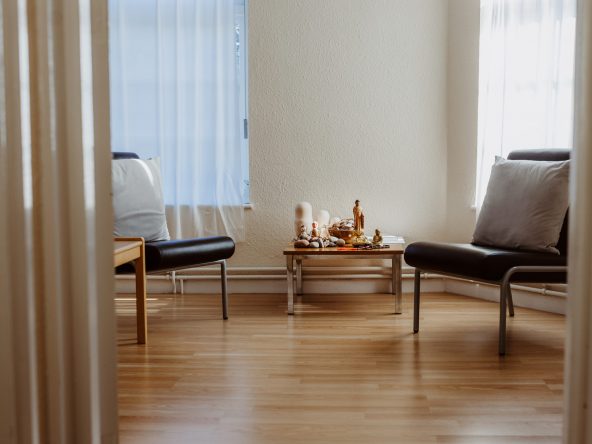
What is Dharma Therapy?
Dharma Therapy is based on 2,500 years of wisdom, knowledge and teachings from a man who became known as the Buddha. The Buddha was a man who was interested in the problem of suffering. He found that there is no way around suffering but that there is a way to overcome it. Suffering is not a problem but a part of life, and more importantly, there is nothing shameful about it.
Dharma Therapy is a form of psychotherapy that draws on many different techniques and modalities. It is based on the theory that the mind works in two different ways, one is to observe and process information from the world around us, and the other is to use our mind creatively and engage the imagination. Another important aspect is the understanding that mental states are conditioned by the object of its attention.
I use a range of techniques including Mindfulness, compassion, acceptance, as well as elements that are found in Person Centred, humanistic, Dialectical Behaviour Therapy (DBT) and Cognitive Behavioural Therapy (CBT) and creative methods such as psychodrama role work.
Psychotherapy is greek for healing the mind or attending to the soul. The Dharma refers to many things, including love, truth, reality and teachings from the Buddha. To embark on this type of therapy is a journey of discovery. We may not be able to prevent suffering but we can learn how to transform it for the benefit of all.


Counselling and therapy in a safe, comfortable and private setting
In Buddhism, the first noble truth is that we will experience Dukkha during our lives. Dukkha is sanskrit for suffering and includes losing a loved one, ageing, illness, and birth, as well as not getting what you had your heart set on and getting what you never wanted.
With suffering arises many feelings, and this too, is a noble truth. Feelings that arise when encountering affliction are not shameful. They may be painful and generate powerful emotions, but they do not last the same forever. However, for most of us, we tend to feel overwhelmed by our feelings and find it easier to cope by distracting ourselves.
It's only when our coping mechanisms start to cause problems that we feel pushed into doing something.
If we feel that we are being backed into a corner, we might then feel that we need help to address the fact that we are suffering and moreover, not coping. This can be a dark time and sometimes the last thing we feel towards ourselves is compassion, this is why and how therapy can help. It is at these dark times in our lives that we need compassion.
Taking the first step to reach out for help can be daunting, however, being open to the possibility of a journey of healing and growth can be the beginning of a process of change and transformation.

Investigate in Confidence using creative techniques
Every journey involves some research into the territory that they are going into. There might be many different reasons for going into therapy, however, no matter who you are and what your background is, sometimes, it is important to start asking questions about the things that are going on in our internal landscape.
Dharma therapy is about peeling away the layers, like an onion in the ground, there is an inner core that is rooted and connected in something deep, something big and something other that can give us strength and confidence that we are on the right path. I like to use a variety of creative techniques that help us to explore more deeply.

Not ok? That's ok
I often hear people say, 'I'm just not good enough.' or, I'll do it later when I have space, or time, or money, or love, or something else. We are motivated by our own lack and that keeps us going, keeps pushing us to be better, do more, and feel great.
Dharma therapy starts with an understanding that suffering is a part of life, whether it be existential or feeling dissatisfied. Instead of running away from the suffering, this form of therapy is about stopping and accepting this reality that we are not ok but that is ok.

Make better, healthier new choices
Once we've examined our lives and have experienced a sense of confidence that this journey will be what it is; sometimes bumpy, sometimes smooth, sometimes going up and sometimes going down.
Accepting the journey for what it is and that feelings will spring up depending on how bumpy and bendy the path, we can then learn how to manage the feelings. Feelings are also noble and they are there for a reason, but they are impermanent and sometimes unreliable, so Dharma therapy teaches how to accept the feelings while stopping certain behaviours that were or are driven by our feelings. In time, we will learn how to create the conditions that can transform your life.
What issues can counselling help with?
People come to me for help a wide range of issues. Here are a few of the more common difficulties that can be supported through counselling:
Stress
Abuse
Depression
Relationship problems
Problems with confidence or self-esteem
Anger
feeling numb
Fear and Anxiety
Sexuality
Post-traumatic stress
Grief, loss or bereavement
Work or retirement
Trauma
Family or school life

My location
I offer online sessions for clients around the world via Zoom, Skype or Teams.
If you would like a session in person, I am based at the West Watford Community Centre in Watford, Hertfordshire, UK.
Contact me to find out more about how online therapy works or to book a session in person.
Articles
Video Clips
Fees
Counselling sessions for individuals last 50 minutes, usually taking place on a weekly basis online or in person.
My fee is £90 per session. I am recognised as a provider with BUPA, AXA, Aviva, Cigna, Vitality, Nuffield, and WPA insurance companies. I have a limited number of conscession rate slots, so please get in touch as I would like to make therapy affordable for you.
Note that if you want to cancel an appointment I require 24 hours notice.

Get in touch
Feel free to contact me if you have any questions about how counselling/therapy works, or to arrange an initial assessment appointment.
All enquires are usually answered within 24 hours, and all contact is strictly confidential. Find out more by reading our Privacy Policy.




